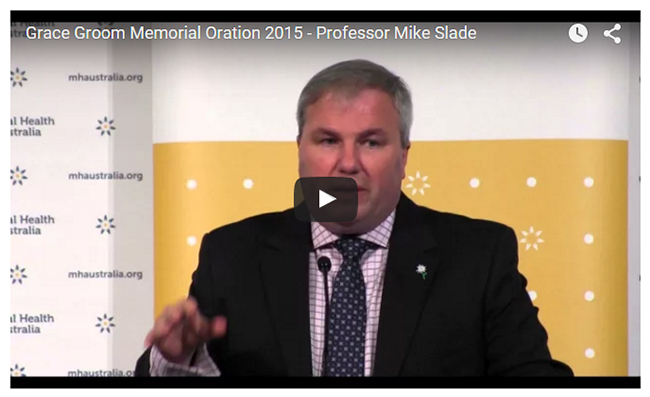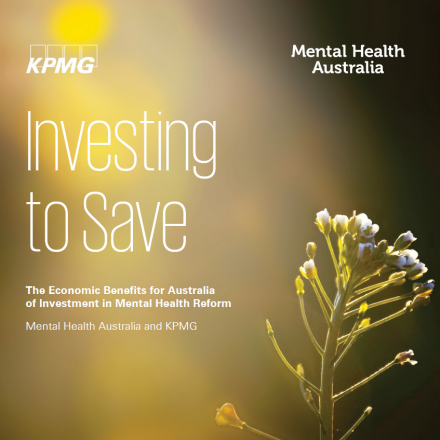CEO Update - 6 November

This Week
At her recent National Press Club address, Minister Sussan Ley renewed her commitment to release the Government’s response to the NMHC Review. Following the Minister’s earlier comments, we will expect a substantial response sometime before Parliament rises for the year, at the end of the first week in December.
There are many areas of uncertainty, with so many balls in the air at the same time. As the Government has finished developing its response, our final advice to them has been to focus on implementation and managing change. We have had so many “mental health packages” over many years, but we have not achieved the level of reform that any of us would hope for. There is almost universal agreement about the broad direction of reform outlined in the National Mental Health Commission’s review; build person-centred care; focus on early intervention and prevention; regional integration of services; stepped care; greater use of online interventions; strengthening community based care and the NGO workforce.
What has been missing from previous packages are clear implementation plans; targets, indicators, capacity building, monitoring and accountability. As we (hopefully) move from considering policy reform to implementing policy reforms Mental Health Australia will be focussed on these important elements of successful change management.
Carer Gateway Advisory Group meeting
On Monday I attended a meeting of the National Carer Gateway Advisory Group in Canberra. This group is advising the Department of Social Services on the establishment of a gateway similar to the Aged Care Gateway. Happily the Department have taken on board our request that this process should be slowed down (the Department had some clear directions about what had to be established before the end of this year) and it is our hope this extended timeframe will leave greater opportunities for consultation than has been available to date. We also pressed the Department on the need to make documents that are available to Advisory Group members available more widely. The Department received this advice positively, and I hope that we will have documents to share widely in the near future.
SA Mental Health Commission
On Wednesday I attended a forum titled “What have Mental Health Commission’s ever done for us?” to mark the establishment of the SA Mental Health Commission. We also attended a briefing with members of the SA Parliament. I was keen to emphasise the important role that Commissions can play in engaging strongly with consumers and carers; in developing cross portfolio strategies, and in holding governments to account for implementing those strategies (including tracking spending). The SA Commission is in its early days of establishment, so the work led by the Mental Health Coalition of SA is likely to have a strong influence on its future direction.
MHiMA Update
The communique that I sent in my last CEO Update discussing the 26 October meeting with former MHiMA consortium members and stakeholders, was sent out to the wider sector including those on the MHiMA mailing list. We have received very positive feedback on our involvement in the MHiMA project with many expressing an interest in engaging with Mental Health Australia on the project.
No new project is without its teething problems, but we are working hard to engage with a wide range of stakeholders to build a new future for the work in transcultural mental health.
In FECCA’s Spring 2015 edition of Australian Mosaic, they partnered with the MHiMA project to present stories on Culturally and Linguistically Diverse (CALD) people and mental health. Below is a link to this edition.
![]()
COAG Mental Health Information Standing Committee
Last week Louise O’Donnell from the Policy Team attended the COAG Mental Health Information Standing Committee (MHISSC). This committee provides a national collaborative forum for the development and implementation of initiatives in mental health information.
Work of the committee that may be of particular interest to members will be the Your Experience of Service (YES) survey instrument which was developed under the guidance of MHISSC. This instrument was the product of the 2010 commitment by the Australian Government Department of Health under the National Consumer Experiences of Care project to develop a survey for use in public mental health services. The YES survey is designed to gather information from consumers about their experiences of care. It aims to help mental health services and consumers to work together to build better services. A copy of the survey can be found on the Australian Institute of Health and Welfare’s website. This version of the survey has been designed for use by governments, however the Australian Mental Health Outcomes and Classification Network (AMHOCN) is currently finalising a community managed organisation version for release early next year. Information on that version is available on the AMHOCN website.
AMHOCN is also developing a consumer self-report measure that focuses on aspects of social inclusion and recovery, the Living in the Community Questionnaire. Details on its development can be accessed on the website.
The committee also received a presentation from the Telethon Kids Institute on the results of the second Australian Child and Adolescent Survey of Mental Health and Wellbeing 2013-14. This survey is the largest national survey examining the mental health and wellbeing of Australian children - conducted in partnership with the University of Western Australia on behalf of the Australian Government Department of Health. The first survey was conducted 1998-2000 and results of the current survey show that mental disorders are still common and disabling in children and young people with almost one in seven (13.9%) of 4-17yr olds being assessed as having a mental disorder in the previous twelve months. The full survey results and report can be found via the link below.
The next MHISSC meeting will be held in March 2016.
![]()
Grace Groom Memorial Oration
For those who may have missed it, the Grace Groom Memorial Oration is now available to watch on YouTube. A transcript of the address is also available on our website.
Reminders
Honest, Open, Proud program
Professor Patrick Corrigan and his colleagues have developed the Honest, Open, Proud (formerly Coming Out Proud) program, as research shows those who have disclosed aspects of their mental illness report a sense of personal empowerment and an increase in confidence to seek and achieve individual goals. The manual and resources to deliver the free program are available via the link below.
HOPp is a three-session group program usually run by a pair of facilitators with lived experiences (such as peer support workers), with the objective of reducing the self-stigma associated with mental illness. The three lessons include considering the pros and cons of disclosing, different ways to disclose, and telling one’s story. Two studies identify the benefits of the program to participants.
Ingrid Ozols and Keith Mahar have agreed to support HOPp in Australia. Those interested in more information can contact either Pat in Chicago (corrigan@iit.edu) or Keith in Canberra (keith.mahar@gmail.com).
![]()
Australian Community Sector Policy and Research Forum 2015
Join ACOSS and the Centre for Social Impact at this two day event designed for not-for-profit leaders, policy experts, practitioners, government, business representatives, academics and researchers to engage in in-depth discussion, analysis and debate across key areas of social and economic research and policy in Australia. The forum will be held in Sydney on 23-24 November. For full details including program highlights, please visit the website.
![]()
NDIS Important Position Paper Survey
HelpingMinds is developing a national position paper on the NDIS in relation to Mental Health Carers and Mental Health Carer Service Provider Organisations. This survey forms part of HelpingMind’s research to develop an understanding of what is and isn’t working on the ground, establish the needs of mental health carers, identify barriers faced by carers and establish the impact of the NDIS on mental health carer organisations. Your responses will be used to support HelpingMind’s position on the NDIS, outlining any key issues, potential solutions and highlight positives experiences by Mental Health Carers. For full details please visit the website.
![]()
Second National Complex Needs Conference
The Public Health Association of Australia - in conjunction with the National Complex Needs Alliance - is holding the Second National Complex Needs Conference in Canberra on 17-18 November 2015. This will be the second Australian conference to showcase successful programs/approaches in addressing complex needs - with the broader purpose of identifying what works and how. Full details including the program and registration details are available from the website.
![]()
Storytelling, Illness and Medicine - 11th Global Meeting of the Health Project
Telling stories help us wrestle with and make sense of the things which happen in our lives. When illness or disease emerge and disrupt our everyday lives, stories play a key role by which we attempt to create meaning in relation to what is happening to us. They also invite others to share and engage in the way we see ourselves during such times, create spaces for sympathy, empathy and compassion and encourage people to share in the process of making sense of health, illness and disease with us. This inclusive interdisciplinary research stream aims to explore the processes by which we attempt to use stories and narratives to create meaning in health, illness and disease. The project will also examine the myths, the models, the metaphors we use to understand our experiences of health and illness and to evaluate the diversity of ways in which we creatively struggle to make sense of such experiences and express ourselves across a range of media.
A call for presentations is now open. If you are interested in submitting a story idea please visit the website for full details.
![]()
ASCA professional development training workshops
Our friends at Adults Surviving Child Abuse (ASCA) currently have a range of workshops available around the country. Workshops include ‘Safeguarding yourself - Recognising and responding to vicarious trauma’, ‘Principles in practice - Supporting adult survivors of complex trauma’, and ‘Working therapeutically with people who have complex trauma histories’.
Professionals may claim CPD hours/credits/points for their participation in ASCA professional training either as a pre-approved or self-directed learning activity. Full details on the workshops, including dates and locations, are available from the website.
![]()
NDIS Evaluation
The National Institute of Labour Studies at Flinders University is currently conducting an evaluation of the NDIS trial and the evaluation team is seeking to speak with people with disability who are not in the NDIS. They may either have chosen not to join the scheme, although they know or believe themselves to be eligible, or their NDIS access request may have been turned down. The team would very much like to hear from these people and learn of their experiences. At this stage, they are planning to conduct focus groups in each of the trial sites. If you would like more information about the evaluation or the focus groups please visit the website.
![]()
TheMHS Summer Forum
Early bird registrations for the 2016 TheMHS Summer Forum are now open. In its 18th year, TheMHS Summer Forum is an annual two-day educational program that highlights a “hot” topic in mental health.
For 2016, one of the most pressing issues in mental health is the impact on our communities of illicit drugs, such as crystal methamphetamine (ice/P). The mental health consequences of illicit drugs present new challenges for consumers, families and carers, governments and mental health services. Forum delegates will be led by experts to examine the challenges from illicit drugs to good mental health services, highlight recent research, and focus on directions for the future. For more information please visit the website.
![]()
Frank
Frank Quinlan
Chief Executive Officer






